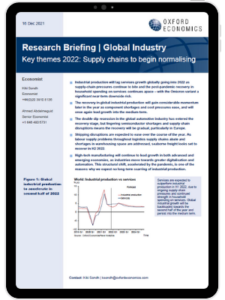Global Key themes 2022: Supply chains to begin normalising

Industrial production will lag services growth globally going into 2022 as supply-chain pressures continue to bite and the post-pandemic recovery in household spending on services continues apace – with the Omicron variant a significant near-term downside risk.
The recovery in global industrial production will gain considerable momentum later in the year as component shortages and cost pressures ease, and will once again lead growth into the medium-term.
What you will learn:
- The double dip recession in the global automotive industry has entered the recovery stage, but lingering semiconductor shortages and supply chain disruptions means the recovery will be gradual, particularly in Europe.
- Shipping disruptions are expected to ease over the course of the year. As labour supply problems throughout logistics supply chains abate and shortages in warehousing space are addressed, seaborne freight looks set to recover in H2 2022.
- High-tech manufacturing will continue to lead growth in both advanced and emerging economies, as industries move towards greater digitalisation and automation.
Tags:
Related Services

Post
UK: Key themes 2026 – Sluggish growth and fiscal worries
We think 2026 will be another challenging year for the UK economy – our GDP growth forecast of 1% is at the bottom of the consensus. Four themes will be key to the outlook, in our view.
Find Out More
Post
Nordics: Key themes 2026 – Bright spots emerging
We forecast growth across the Nordic economies to diverge somewhat next year but share the same underlying drivers.
Find Out More